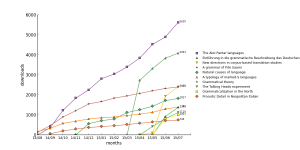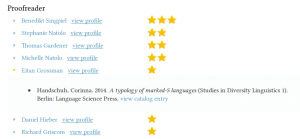PKP – the Public Knowledge Project – is a non-profit research initiative that focuses on how publicly funded research can be made freely available through open access policies. One of PKP’s projects is Open Monograph Press (OMP), an open source software that let us set up our web site and back-office management swiftly and with only minimal costs. The 5th PKP conference took place from August 11-14 in Vancouver, Canada. Here are my impressions.
Access stats for open access books.
Since we setup the new servers at CeDiS, we track our usage stats. In this blogpost, I will give some technical details, discuss some conceptual issues and finish with some mathematical remarks.
Technical details
We run Apache as a web server. The logs are analyzed and aggregated with awstats. Awstats also takes care of separating “real users/readers” from “machine readers” (bots). Including the bots would artificially inflate our reader numbers, so it is good to exclude them.
In the past, we tracked access with a spreadsheet, but we now use an automated routine which parses the awstats output, aggregates access data per book and produces graphics for each book and then again for all books combined (using python, beautiful soup and matplotlib). Continue reading
2700+ book downloads in two weeks: Interview with Roland Schäfer

Roland Schäfer
Roland, congratulations to your text book Einführung in die grammatische Beschreibung des Deutschen which got more than 2,700 downloads within the two weeks following publication and now leads the list of our most downloaded books.
Thanks a lot for publishing the book.
What is your textbook about? Are there not enough introductory textbooks around?
The book is about the basic facts of German grammar: surely not everything, but a large portion of what students of German linguistics should know about German grammar. At the same time, it introduces students to the standard methods used by linguists (at least traditionally) to dissect a language, i.e., mostly distributional analyses in phonology, morphology, syntax, and graphemics. No matter which theories or methods you’re going to use later, it’s hard to get by without knowing your basic categories…
New book: Grammaticalization in the North
We are happy to 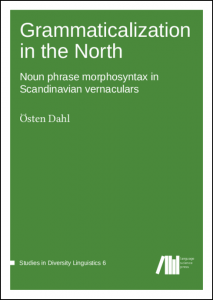 announce a new book in our Series Studies in Diversity Linguistics: Östen Dahl’s Grammaticalization in the North: Noun phrase morphosyntax in Scandinavian vernaculars.
announce a new book in our Series Studies in Diversity Linguistics: Östen Dahl’s Grammaticalization in the North: Noun phrase morphosyntax in Scandinavian vernaculars.
New book: New directions in corpus-based translation studies
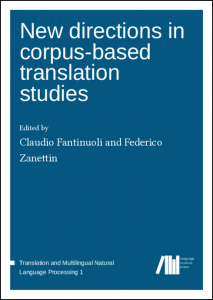 We are happy to announce the first book in the series Translation and Multilingual Natural Language Processing: “New directions in corpus-based translation studies” edited by Claudio Fantinuoli and Federico Zanettin.
We are happy to announce the first book in the series Translation and Multilingual Natural Language Processing: “New directions in corpus-based translation studies” edited by Claudio Fantinuoli and Federico Zanettin.
Axes of Open Review
At Language Science Press, we are experimenting with Open Review. While investigating how we could implement an Open Review system, we discovered that there are actually very different things which could be called Open Review, and even in a small team, opinions differ as to what is the real thing.
Axes
We have established the following dimensions:
| open | not open | |
|---|---|---|
| Selection process | anyone can comment | a restricted class of people can comment |
| Transparency | the names of the reviewers are revealed | the names of the reviewers remain anonymous |
| Online | the reviews are created on the Internet | the reviews are created offline (e.g. pdf comments in a file) |
The following criteria do not apply to openness, but are nevertheless relevant:
| Time | final publication will incorporate comments | publication is finished before commenting is open |
| Relevance | comments have an influence on the acceptance | comments exist next to a different process of quality assurance |
| Scope | comments are local, paragraph level at the maximum | global comments, appreciation of the whole work |
New book: The Talking Heads experiment: Origins of words and meanings
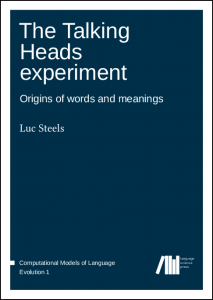 We are happy to announce the first book in the series Computational Models of Language Evolution “The Talking Heads experiment: Origins of words and meanings” by Luc Steels.
We are happy to announce the first book in the series Computational Models of Language Evolution “The Talking Heads experiment: Origins of words and meanings” by Luc Steels.
The Talking Heads Experiment, conducted in the years 1999-2001, was the first large-scale experiment in which open populations of situated embodied agents created for the first time ever a new shared vocabulary by playing language games about real world scenes in front of them. Continue reading
New features on our website
We have updated our website and are happy to announce a couple of new features:
Hall of Fame and Public Profiles
The Hall of Fame now shows links to public profiles of the users. To view the profiles you have to be logged in. The profile shows the institution and website you added to your profile, as well as the bio statement you provided. Additionally, the public profile shows a person’s achievements supporting Language Science Press as author, proofreader or typesetter. The published monographs a user has worked on are listed here.
New book: Einführung in die grammatische Beschreibung des Deutschen
 We are happy to announce the first book in the series Textbooks in Language Sciences: “Einführung in die grammatische Beschreibung des Deutschen” by Roland Schäfer.
We are happy to announce the first book in the series Textbooks in Language Sciences: “Einführung in die grammatische Beschreibung des Deutschen” by Roland Schäfer.
This textbook is an introduction to the descriptive grammar of German on the levels of phonetics, phonology, morphology, syntax, and graphemics. It is a recommended read for anyone interested in the grammar of German and especially for students of German philology. The book focuses on how grammatical generalizations are derived from concrete linguistic material while covering a huge number of the important phenomena of German grammar. No specific theoretical framework is adopted in the book but it constitutes an ideal starting point for reading more theory-specific textbooks and accessible research papers. Despite its length, the book is suitable for inclusion in all sorts of curricula because more advanced parts are clearly marked and can be skipped, and the five parts of the book can be read separately. Almost all chapters contain a large number of exercises with complete solutions in the appendix.
Electronic book formats
Language Science Press currently offers electronic versions of published books only in PDF format. This blog post describes our plans for providing additional book formats in the near future and our recent progress.


